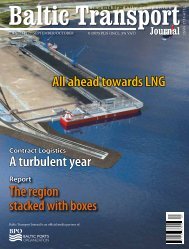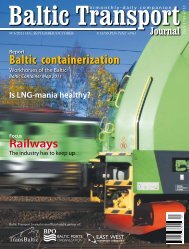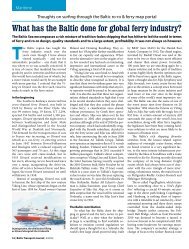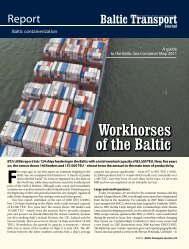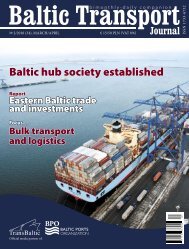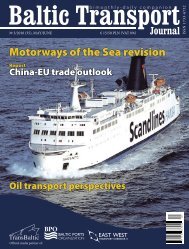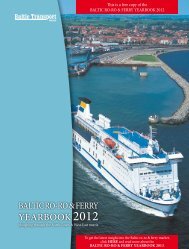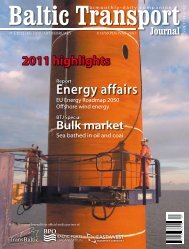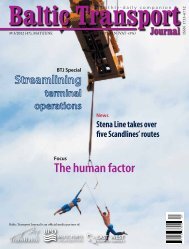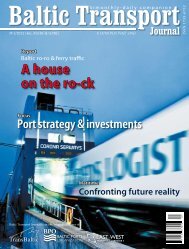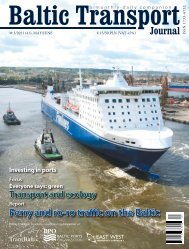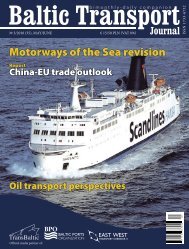Create successful ePaper yourself
Turn your PDF publications into a flip-book with our unique Google optimized e-Paper software.
This would have left the ports governed<br />
by the basic principles of the<br />
Treaty and secondary legislation.<br />
The essential question was<br />
whether it was in the interest of the<br />
ports to be subject to an incoherent<br />
patchwork of jurisprudence and legislation<br />
which often demonstrated contradictions, the<br />
conflicting objectives of the EU transport and<br />
environmental policy being a case in point.<br />
Beyond the traditional context<br />
Already in 2004, ESPO made a plea for a<br />
thorough reflection of the priorities to a European<br />
seaport policy, expressing the need for a<br />
coherent framework within a broad perspective<br />
focusing on the main challenges of the port sector.<br />
The time for such a profound discussion only<br />
became pertinent after the failure of the second<br />
Directive proposal. Several factors helped to<br />
bring the debate back on its feet. First there was<br />
the determination of <strong>Transport</strong> Commissioner<br />
Jacques Barrot to restore a climate of confidence<br />
after the traumatic experience of the Directive.<br />
Second the Commission had launched a process<br />
to develop a comprehensive and integrated<br />
maritime policy which would inevitably cover<br />
ports. Finally there came a proposal from ESPO<br />
to organize a wide-ranging stakeholders consultation<br />
on the principal themes and challenges<br />
to the European ports’ policy. The latter two<br />
broadened the scope of the debate beyond the<br />
traditional transport policy context.<br />
Between June 2006 and June 2007, a stakeholder<br />
consultation process was held which<br />
consisted of two conferences and six thematic<br />
workshops. This resulted in adopting the communication<br />
policy on European ports by the<br />
Commission on 18 October 2007. The communication<br />
resorts to the Commission’s integrated<br />
maritime policy and forms part of<br />
its freight transport agenda, which were both<br />
adopted around the same time.<br />
Balanced picture reflected<br />
The Commission’s new communication<br />
is based on an overview of the general challenges<br />
to the European ports’ system. These include<br />
the demand for international transport,<br />
technological change, emissions and climate<br />
Maritime<br />
A new policy for the European seaports<br />
No traffic flow reorientation<br />
Following the failure of the second port services’ Directive in<br />
2006, it looked for a while as though the prospect of a European<br />
ports’ policy was definitely off the table.<br />
change, dialogue between the ports, cities and<br />
stakeholders and, finally, reconciliation with<br />
transparency, competition and, in general, the<br />
Community’s set of rules.<br />
The communication’s actual policy proposals<br />
generally consist of a mixture in interpreting<br />
the Treaty rules and an action plan<br />
with further measures and instruments, which<br />
are mostly of a “soft law” nature, i.e., which are<br />
not legally binding but have certain indirect<br />
legal effects and aiming to produce practical<br />
effects. These relate to the following areas:<br />
port performance and hinterland connections,<br />
expanding capacity while respecting the environment,<br />
modernisation, a level playing field<br />
– clarity for investors, operators and users, establishing<br />
a structured dialogue between the<br />
ports and cities and, finally, work in ports.<br />
ESPO has given a positive response to the<br />
Commission’s communication. We believe the<br />
new policy generally reflects the balanced picture<br />
that emerged from the stakeholders consultation.<br />
We have also welcomed the broad perspective<br />
of the communication which included<br />
topics such as capacity expansion and port-city<br />
relations, which were never thoroughly discussed<br />
at a European level despite their vital importance<br />
for many ports on the continent. ESPO<br />
agrees with the general focus of the communication<br />
on soft law measures and instruments,<br />
which complement the diversity of European<br />
ports better than stringent legislation.<br />
Let the market find its solutions<br />
In this respect, we especially appreciate the<br />
Commission’s recognition of the pivotal role of<br />
port authorities, notably with regard to the use<br />
of concessions. Defined in a broad sense, concessions<br />
are very useful governance instruments for<br />
public landlord port authorities and often the<br />
only tools they have at their disposal to protect<br />
the legitimate interests of their ports. The interpretation<br />
given by the Commission broadly<br />
corresponds to the principles we believe port<br />
authorities should apply when granting concessions,<br />
i.e., in regard to selection criteria, durations<br />
as well as performance, and ownership clauses.<br />
ESPO is currently undertaking a study on how<br />
European port authorities are using concession<br />
instruments. The results will be presented at our<br />
annual conference to be held in Hamburg on<br />
Patrick Verhoeven is the Secretary General,<br />
the European Seaports Organisation<br />
(ESPO).<br />
May 29-30, <strong>2008</strong>. The results may lead to further<br />
comments and initiatives at a later stage.<br />
ESPO has also welcomed the fact that the<br />
Commission is not seeking to develop measures<br />
which would alter the distribution of traffic across<br />
Europe. The market, in combination with policies<br />
of regional and national authorities, is largely capable<br />
of finding its own solutions. The European<br />
port scene is indeed becoming more diverse in<br />
terms of the number of ports involved along with<br />
the scope of port functions and services which, in<br />
turn, are leading to more routing options for shippers.<br />
It is our belief that the Commission should<br />
refrain, now and in future, from any interventionist<br />
policies which, directly or indirectly, aim at reorienting<br />
traffic flows in Europe.<br />
Finally, we look forward to continuing the<br />
constructive dialog with the services of the Commission<br />
and other stakeholder organizations on<br />
the instruments and measures which are announced<br />
in the communication. ESPO is particularly<br />
interested in contributing to the guidelines<br />
on the application of Community environmental<br />
legislation to port development and State aid<br />
guidelines.<br />
Patrick Verhoeven<br />
Find more on this<br />
topic at TOC Europe<br />
Conference,<br />
17-19 June in Amsterdam,<br />
where<br />
Mr Verhoeven will<br />
be a panelist in the<br />
plenary session: The Outlook for Europe.<br />
3/<strong>2008</strong> | <strong>Baltic</strong> <strong>Transport</strong> <strong>Journal</strong> | 17



